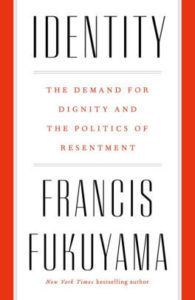 Stanford University’s Francis Fukuyama always challenges our minds. From his The End of History and the Last Man, addressing our futures after the end of the Cold War (1992), and continuing with The Origins of Political Order (2011) and Political Order and Political Decay (2014), two monster 600+ page tomes, his newest, and briefest (a slim 183 pager!) is Identity.
Stanford University’s Francis Fukuyama always challenges our minds. From his The End of History and the Last Man, addressing our futures after the end of the Cold War (1992), and continuing with The Origins of Political Order (2011) and Political Order and Political Decay (2014), two monster 600+ page tomes, his newest, and briefest (a slim 183 pager!) is Identity.
Who on earth are we? Fukuyama sees we humans as trying to manage, simultaneously, two conflicting pressures. The first is “isothymia,” — “the demand to be respected on an equal basis with all other people,” and “megalothymia” — “the desire to be recognized as superior.” This disparity has “historically existed in all societies; it cannot be overcome; it can only be channeled or moderated.”
He continues: “Contemporary identity politics is driven by the quest for equal recognition by groups that have been marginalized by their societies. But that desire for equal recognition can easily slide over into a demand for recognition of the group’s superiority.”
His themes are thymos (the third part of the soul), recognition, dignity, identity, immigration, nationalism, religion and culture. He calls on many earlier observers: Socrates, Luther, Rousseau, Kant, Hegel, Hobbes, Locke, Mill, Nietzsche, Herder, Adam Smith, Sartre, Freud, and Kahneman, arguing that the demand for dignity, “should somehow disappear is neither possible nor desirable.” Resentment at indignities remains a powerful force, a “craving for recognition” we must learn to understand and balance.
National identities are “critical for the maintenance of a successful political order.” They begin with a “shared belief in the legitimacy of the country’s political system, whether that system is democratic or not.” They include physical security, quality of government, economic development, “a wider radius of trust,” and strong social safety nets, all of which eventually make possible “liberal democracy itself.”
His chapter on religion and nationalism is particularly challenging. Can people who share a particular culture and language be subsumed into a global belief system (Hinduism; Buddhism; Communism; Islam; Christianity)? Probably not, but these systems continue to try. The advent of social media makes “identity” now the property of groups, not individuals.
Fukuyama cannot resist a comment of Trump, a “political figure who almost perfectly describes … narcissism: narcissism led Trump into politics, but a politics driven less by public purposes than his own inner need for public affirmation.” And “Trump (is) the perfect practitioner of the ethics of authenticity that defines our age: he may be mendacious, malicious, bigoted, and un-presidential, but at least he says what he thinks.”
“What is to be done?” he asks. One, ”confusion over identity” is a “condition of living in the modern age.” Two, a “pan-European identity may someday emerge.” Three, “education is the critical ingredient”, but it must include a process of universal not parochial values, economic mobility, interdependence, and a growing exposure to other humans and their customs.
We humans seem to be simultaneously breaking down walls and building new ones!
Editor’s Note: ‘Identity’ by Francis Fukuyama was published by Farrar, Strauss and Giroux, New York 2018

About the Author: Felix Kloman is a sailor, rower, husband, father, grandfather, retired management consultant and, above all, a curious reader and writer. He’s explored how we as human beings and organizations respond to ever-present uncertainty in two books, ‘Mumpsimus Revisited’ (2005) and ‘The Fantods of Risk’ (2008). A 20-year resident of Lyme, he now writes book reviews, mostly of non-fiction, which explores our minds, our behavior, our politics and our history. But he does throw in a novel here and there. For more than 50 years, he’s put together the 17 syllables that comprise haiku, the traditional Japanese poetry, and now serves as the self-appointed “poet laureate” of Ashlawn Farm Coffee, where he may be seen on Friday mornings. His late wife, Ann, was also a writer, but of mystery novels, all of which begin in a village in midcoast Maine, strangely reminiscent of the town she and her husband visited every summer.